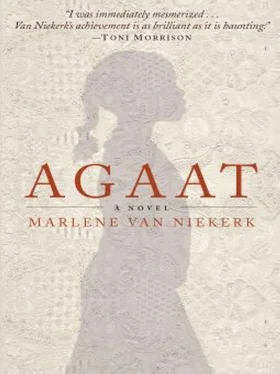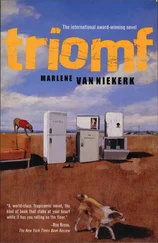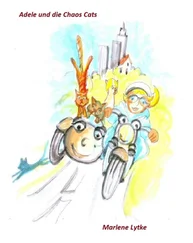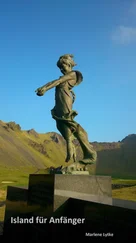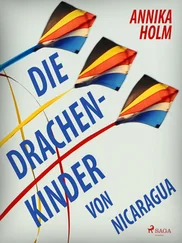Made myself scarce because next thing I heard sniffling there in the kitchen & I don’t know whether it’s Lietja or A. that’s bawling but A. doesn’t cry of course. Then I heard J. there in the kitchen egging A. on: Go & sing your white stepmother a little song, go on: Anything you can do I can do better.
A. in the outside room all afternoon. Very quiet.
There’s not a single farmer of my acquaintance who could do that sum.
How can I do it to her?
That October after Jakkie’s birth, after the battle with Agaat over the christening robe, five things happened that changed everything on Grootmoedersdrift. First Jak had the cattle-troughs with licks & the salt blocks removed from the lands. And then you noticed one day that the farm boys’ wire cars were no longer built from wire but from bones. White vertebrae, white ribs, white collarbones, little white carts of death rattling over the yard. Without your putting two and two together. The third thing was Jak’s new hunting rifles. What was he on his way to do when he left the house with the long leather bags? You didn’t want to know. And then there were your diaries. Somebody was reading your diaries. Or that’s what you thought. But most important of all was the change that came over Agaat. You saw her looking with new eyes at the two of you. But mainly at Jak, as if she was noticing him for the first time.
Five things that preceded that first catastrophe. Five things that helped shape all future catastrophes.
In the evenings there were the squabbles over the farm as usual, over your compost heaps, over your pumpkins amongst the pear trees.
It’s not a laboratory, Jak, you said, it’s mixed farming, the surfaces can’t be bare and sterile without a sign of the processes that keep a farm healthy.
There he sat, pushed away his plate of food, taking apart his rifles and putting them together again, firing silent shots at the ornaments in the sitting room. Through the sights. Click. Click. You thought it would drive you mad. It fascinated Agaat. Not the rifles. Jak’s face, his hands.
Then she brought home the story one evening. End of October 1960 it was.
The cows are eating tins.
Just as Jak was taking his first mouthful.
What tins now?
You had Jakkie in your lap, were trying to get him to take to his bottle.
Paraffin tins, car-oil tins, turpentine tins, sheep-dip tins, molasses tins, she said.
That they pick up where, Agaat? you asked.
You were incredulous. Why would cows eat tins? You thought she was inventing it to pay you back for the punishments she’d suffered.
Agaat was silent.
Ag, the stupid cows of yours, said Jak, probably calving again, you know they’re always full of shit then, if it’s not the trembles, then it’s something else.
I’m just asking, where do they find that particular collection of tins to eat? Do they select them in the supply shed?
You looked at Agaat.
The tins are lying in the little grazing at the back next to the river amongst the stones, Agaat said.
Full sentence with prepositions. From a grammar book for second-language speakers.
She jutted out her chin.
Jak pointed his fork at Agaat. They’re my tins, leave them just there where they are, or you’ll be given another field to plough!
You handed Jakkie to her. He wouldn’t drink so well with you. She just stood there with the child in her arms.
It’s my shooting range, dammit, I do target-shooting at the bloody tins! Jak exploded. And that’ll be the day that I let myself be put off by a bunch of silly cows from enjoying the little bit of healthy recreation that I’m allowed in this internment camp.
You gestured to Agaat that she could leave. At her leisure she walked out, her ears flapping backward under her cap.
She must keep her nose out of my business, I’m telling you here and now, she’s carrying on as if the farm belonged to her. And. . and. .
Jak was red in the face. With an oil cloth he polished furiously at the barrel of his rifle.
Yes, Jak, and what else?
You were used to it. Always in such situations he brought it up. Agaat was the cause of everything that went wrong, and you were the cause of Agaat. With your finger to your lips you signalled he should lower his voice.
And, he said, if I ever have to hear again that my child, my little Jakkie. . I’ll cut off her two tits for her one by one and throw them to the pigs! What must the people think? Jak de Wet’s child is being. . suckled by a. . by a cast-off kitchen-goffel!
You were startled. Who had read, who had seen, who had told whom?
You kept your cool. Where do you find such rubbish? you asked.
Jak was on his feet, he knocked his chair over backwards.
I hear it from the labourers! I hear them talk! They know everything that happens in this house, you say so yourself! Dawid’s cousin says Saar saw it. They piss themselves laughing, the hotnots. Where do you think this must end? What must they think of me? So-called lord of the manor?
You don’t know how much Agaat is worth to me, you said. You would probably never even have had a son if it hadn’t been for her. And perhaps not even a wife.
Bluff back. But your heart was beating in your throat. Could Agaat have planted the story herself?
Dammit, Milla, once again that pretty-pious little story of yours, how long do you think you’re still going to entertain me with it, your stupid serial? Go and write it up for Springbok Radio, go on, you’ve hardly put that skivvy of yours in her place than you start praising her to the skies all over again. Agaat of Grootmoedersdrift, Littletit of the Overberg! Then they can listen to it on the wireless every day from Caledon to Swellendam.
Jak slammed doors in his storming out.
A mite vehement about cows eating tins, you thought. A mite fierce over a mere rumour amongst the labourers. But it was only the following day that you realised why Jak had been on the defensive.
You were numbering the diaries that were full. From ’53 onwards. In the correct sequence, with the periods that they covered written clearly on the cover. So that you could keep exact tally of how many there were. High up in the bedroom wardrobe you were putting them away. Under the eiderdowns.
Then Agaat came to call you.
Come and have a look, she said, the boys say it’s not just tins that the cows are eating.
You followed her to the grazing next to the river. There against the wilderness of brambles the pregnant cows were standing and eating white ribs, the carcase of a cow that had been lying there for a long time. The white shards were sticking out of their mouths as they were chewing. You gazed at the drooling and the crunching, too shocked to put one foot in front of the other. To one side the cows’ off-colour calves were standing neglected, watching.
Dawid says he shot Blommetjie and Gesina yesterday, Agaat said, they must also have eaten funny stuff.
She went to show you, two cows on the other side of the river.
Blommetjie had already burst open. You could see the dead foetus of her calf. Blommetjie, a great-granddaughter of Grootblom, another one of the Grootblom clan from your mother’s old herd.
All that you could get out of Jak was that the cows wouldn’t get up and that they were lying in the grass drooling with their heads in their flanks and that he’d wanted to put them out of their misery.
You phoned the vet in town. He would come and see what he could do but he didn’t have serums, he would order them immediately from Onderstepoort. If the sickness was what he thought it was. It could take a week to arrive.
You grabbed Agaat by the apron and shook her.
Why didn’t I hear the shots more often? Why don’t we ever hear anything? Why do I only learn about this now? Why did nobody come and tell me that the cows didn’t seem right? Why don’t you notice things, I know you know what a healthy cow looks like!
Читать дальше
